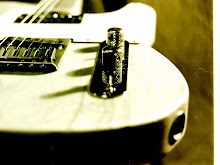
Personally, I like it … a lot! I admire the experimentalism and rawness of the album, which is basically just Neil’s voice and his guitars (mostly electric) sonically treated with producer Daniel Lanois’ studio effects and sonic embellishments. While I’m a long-time admirer of Lanois’ work as an artist in his own right and as a producer of outstanding works by the likes of Dylan, U2, Emmylou Harris and others, there are few times on this CD when the recording effects are taken just a little too far – detracting from the essence of songs rather than enhancing them. That said, most of the time it works, and there’s no denying that Lanois’ soundscapes are a fundamental part of the album.
Raw and unfinished sounding at points, there’s a loose jam feel to the recording (though it’s Neil jamming with himself and Lanois’ recording console). Knob-twiddling aside, the focus of Le Noise is on the songs at their core – the chord progressions, the arrangements and the heartfelt and often very personal lyrics.
Neil Young’s recorded catalog has never been a happy-go-lucky affair. (On stage a number of years ago he joked, “I may sound really down in my songs, but don’t worry about me, I’m doing just fine.”) There’s a definite sense of melancholy running through Le Noise. At 64, the artist seems to be reflective, if not wistful; regretful and disappointed, particularly that the idealism of his hippie youth remains largely unfulfilled. There’s a tangible sense of loss, seemingly fueled by the passing of close friends.
Tonally, this is a serious sounding record. It’s resolute and passionate, but not quite dour, there’s too much energy in it for that. Neil’s brittle voice weaves in and out of his diminished chords, distorted sustain and delicate arpeggios with purpose, familiarity, comfort and (at times) hope.
I must admit, that my perspective on Le Noise is somewhat colored by the fact that, prior to its release, I heard Neil perform all but two of the songs during his “Twisted Road” solo tour last spring. That was an amazingly impressive concert (see my review). Even in Neil’s live rendering of these new tunes, there were a lot of the effects used to flesh out and color the spartan sound of just the man and his guitar. But on Le Noise, those effects are markedly more prominent.
The album kicks off with the sonic assault of “Walk with Me,” a scene-setting artistic statement replete with distorted, sledgehammer, electric guitars and multi vocal effects that eventually lead to a bridge conjuring up Tommy-era Who before fading out with some low-key synthesizer blurbs. The layered effects work wonderfully on this song.
Less effective, though certainly not a total loss, is “Angry World,” one of only two Le Noise songs not performed during Neil’s spring/summer “Twisted Road” tour. It starts with a repetitive vocal effect, giving it an arty feel, before Neil’s typical electric guitar chording and riffing intercedes in support of thoughtfully catchy verse vocals. Unfortunately, the momentum is then fumbled by a chorus that is quite lame vocally and lyrically. (Even the repeatedly echoed “V-8” refrain can’t quite save it.) Thankfully, it’s the only such instance on the CD.
The remaining six tracks on Le Noise are all worthy additions to the Young canon. Among the stand outs are “Someone’s Gonna Rescue You,” the other non-“Twisted Road” tour song on the CD (though it would’ve fit that set nicely). It has undercurrents of vintage Crosby, Stills, Nash & Young in the rhythm guitar and classic high-pitched Neil vocals with gurgling sonics percolating just beneath the song’s surface.
The confessional travelogue/drug diary that is “Hitchhker,” a long-unreleased gem from 20+ years ago, was universally hailed as one of the highlights on “Twisted Road” and it’s rendered powerfully here. On Le Noise it’s more restrained, with a less dynamic guitar attack and less urgent vocal delivery. But even if it doesn’t quite match the live versions from earlier this year, it’s still a highlight of the album. It’s an entertaining and, ultimately, thought-provoking song. Raw and literal as it is, it alone is almost enough to make me really love this album.
Despite the distinct approach and consistent construction, Le Noise is no one-trick pony. Amid all the heavy sonic enhancements on the electric tunes, the album’s two acoustic songs stand out all the more potently in contrast.
The somber resignation of the Spanish cum country & western instrumentation of “Love and War” is reminiscent of Neil’s early ’90s Unplugged sessions – with its ringing reverbed acoustic guitar and a brief, slow hint of the riff in “My My, Hey Hey.” The refrain of “Daddy won’t ever come home again” is nothing short of heart-wrenching. Powerful stuff.
Meanwhile, a resonant acoustic riff gives a characteristic poignancy to “Peaceful Valley Boulevard.” Unlike the previous comparisons, this song is better on Le Noise than it was in concerts earlier this year. It’s yet another quintessentially Youngian tale connecting 19th-century western imperialism at the expense of Native Americans (“Change hit the country like a thunderstorm”) to current the ecological plight. (“Who’ll be the beacon in the night?” indeed.) It's dangerously close to preachy at points, but no doubt heartfelt and largely on the mark, in my view.
As a whole, the songs on Le Noise are raw shots of emotion rooted in nerves never far from the surface. But, because Neil Young is such a masterful craftsman and performer, they make for remarkably refined and highly rewarding listening. Le Noise is yet another example of the artist’s uncompromising vision and course. What he does next will undoubtedly be something completely different. That’s OK, too ... but there will always be Le Noise.





No comments:
Post a Comment